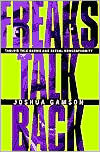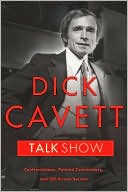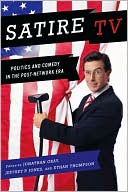Freaks Talk Back; Tabloid Talk Shows and Sexual Nonconformity
Using extensive interviews with talk show production staff and former guests, hundreds of transcripts, focus-group discussions with viewers, and his own experiences as a frequent studio audience member, Joshua Gamson brings to life the wild, paradoxical process through which stigmatized individuals become stars of tabloid television.
Search in google:
Using extensive interviews, hundreds of transcripts, focus-group discussions with viewers, and his own experiences as an audience member, Joshua Gamson argues that talk shows give much-needed, high-impact public visibility to sexual nonconformists while also exacerbating all sorts of political tensions among those becoming visible. With wit and passion, Freaks Talk Back illuminates the joys, dilemmas, and practicalities of media visibility."This entertaining, accessible, sobering discussion should make every viewer sit up and ponder the effects and possibilities of America's daily talk-fest with newly sharpened eyes."—Publishers Weekly"Bold, witty. . . . There's a lot of empirical work behind this deceptively easy read, then, and it allows for the most sophisticated and complex analysis of talk shows yet."—Elayne Rapping, Women's Review of Books"Funny, well-researched, fully theorized. . . . Engaged and humane scholarship. . . . A pretty inspiring example of what talking back to the mass media can be."—Jesse Berrett, Village Voice"An extraordinarily well-researched volume, one of the most comprehensive studies of popular media to appear in this decade."—James Ledbetter, Newsday Elayne Rapping . . .[A] bold, witty look at the genre from a perspective at once highly scholarly and deeply personal. . . .the most sophisticated and complex analysis of talk shows yet. . . .it manages to take the stale and boring formulas of 'high' versus 'low' cultural debate. . .to a new and more complex plane. — The Women's Review of Books
\ Freaks Talk Back\ \ \ \ Tabloid Talk Shows and Sexual Nonconformity\ \ \ \ By Joshua Gamson\ \ \ University of Chicago Press\ \ \ \ Copyright © 2003\ \ \ University of Chicago\ All right reserved.\ \ ISBN: 0-226-28065-9\ \ \ \ \ \ Chapter One\ \ \ Texas Cheerleaders and Sickly Posses\ \ Former talk show producer Mike Kappas:\ As a booker, you're supposed to be there at like five or six in the\ morning, reading the papers and calling. So one morning I read in the\ New York Times about how in some small town in Texas, four cheerleaders\ were kicked off the cheerleading squad because they were all pregnant.\ And there was this huge controversy in this town, because it was the\ three black girls didn't have abortions, and the one white girl did have\ an abortion and she was allowed back on the team. But the school wasn't\ giving names, nobody was giving names. But as a booker you're trying to\ be a little creative, so what I thought of was, okay, these mothers,\ these fathers, they must work somewhere, and I bet they work at a\ fast-food restaurant. So I called all the fast-food restaurants in the\ area and it turned out the mother of one of the girls worked at the\ Dairy Queen, and I got her on the phone that morning, and two hours\ later I was on an airplane. Little did I know thatCurrent Affair and\ People magazine and The Jerry Springer Show were all following me. It\ turns out that she told someone, and they found out what flight I was\ on, and they were following me because they knew I had the lead.\ And I mean this tiny, podunk, trailer-park town, was all of the sudden\ deluged by everybody. The town just had a four-way stop sign, and you\ saw all these people and limousines and TV crews. The hotel was like\ this dinky hotel that was full to capacity from all media people, and\ like the room I was in, the last weekend there was like a trucker brawl\ murder. That town was like attacked by sharks, and they didn't know what\ hit them. Now I wasn't going to go into the high school and wait outside\ their classrooms. That's what they wanted you to do, the producers, they\ wanted you to go into the high school. They were on the phone, like,\ "Get the biggest limousine you can find, like impress these people with\ your money." Montel Williams' producers got a big limousine and paraded\ his money around the school.\ So anyway I went to the woman's house. She was having second thoughts,\ she was all nervous. I was told this woman lives on a big house on the\ corner. The house didn't have a screen door, it didn't have a door. I\ mean, it was the big house next to all the trailers. It was sad. I had\ dinner with them. We got chicken, and there were like cockroaches\ walking across my hands as I was sitting on their floor. I finally left\ them at 11 o'clock, and I was coming back with my car to pick them up at\ six in the morning. I got there at 5:30 in the morning to find Jerry\ Springer's people there with a limousine and $1,000, taking them into\ the limousine. And they stole my guests. The reason why Jerry Springer\ got the interview is because they went into the school and found the\ cousin of the girl that I got, and said, "I'll take your cousin and you,\ and your boyfriend, and give you money to come on our show." And I never\ was so upset in my life. I was shaking. I couldn't believe it. I mean, I\ was going to get fucked, I was going to lose my job. And I couldn't\ believe it. All of a sudden it wasn't what's the good story, it became\ get the booking.\ And when you're one of these people, and you've got all that attention,\ and all these people, and all this business, you lose your sense of like\ what am I doing. It's like you go from never leaving town-like Houston\ was the biggest city they ever went to, and some of these people had\ never been there-and it's like you're offering them this vision of\ grandeur, and it's to exploit them. You tell them what they want to\ hear. You lie to them so convincingly.\ A good deal of dishonesty is simply built into the way talk shows are\ produced. Shows that rely primarily on letters from potential\ participants, and "cart calls" requesting guests on a particular topic who\ then call in on toll-free lines, are virtually requests for people to mold\ themselves in advance. "Half the guests are making up a story just to be\ on TV," says the Leeza producer. Although that percentage is rhetorical\ rather than literal, the motivation of television exposure, and the\ subsequent molding of oneself to the expressed needs of talk show\ producers, is commonplace. The guests Patricia Priest calls "moths," those\ "lured by the flickering light of the screen" towards their fifteen\ minutes, many of whom write letters to talk shows pitching their own story\ (another common source of guests), are especially beckoned by the\ recruit-by-promo strategy. "If I'm on TV, I'm worthy of something," one\ such participant told Priest, for instance, "because there's a lot of\ people watching me." Another said she simply wanted to be able to say,\ "I'm on television." A viewer like this who wants to be on television, and\ who regularly watches talk shows, will not only know the rules of the game\ (be lively, have good one-liners, and so on) but can also cast herself in\ the advertised role. Much like the game-show-Rolodex producer's "Don't you\ want to sleep with such and such?" questioning, this method of recruiting\ leads the witnesses. You may not hate your grandmother's new husband that\ much, or have that much trouble with the way your wife looks at other\ women, but if you want to be on television, but if you want to be on\ television, and if Jenny Jones is looking for people who hate their\ grandparents' spouses or suspect their wives of being attracted to women,\ it is not a huge stretch.\ Shows in which guests are pursued (rather than invited to pitch their\ stories), on the other hand, place the burden of deception on the\ producers, who must persuade these guests to come on the show. Randy\ Tanner, a former talk show production-company vice president and\ occasional producer, puts it this way.\ You do this dance with them in the beginning. It's like, "Oh, you have\ obsessive compulsive disorder? I have obsessive compulsive disorder. You\ know, I wash my hands uncontrollably. You hate your sister's husband?\ You know what, I hate my sister's husband, too. That son-of-a-bitch."\ It's like, "Oh, you're a transvestite? You know, once I dressed up in a\ dress. I just wanted to see what it felt like and I still kind of like\ it. It still kind of turns me on a bit. Yeah, I wear panties underneath\ my suit, but don't tell anyone." You're trying to seduce a person who's\ on the other end of a telephone. Because if you can get them, that's how\ you make your money. And how else are you going to do that other than\ trying to make them feel comfortable, trying to make them feel like you\ understand, that you're one of them?\ "You have to say exactly what they want to hear," says Mike Kappas, who\ worked as a talk show booker. "You've got to say whatever it is to get\ them on your show." When he saw a story in USA Today about a woman whose\ 5-year-old daughter was raped by her brand new husband, for instance,\ Kappas knew what to do.\ You've got somebody on your back saying "Did you make the call? Did you\ get the booking?" The story was that during the wedding reception, the\ husband took the daughter, now his stepdaughter, upstairs and raped her,\ and then told his new bride and the daughter that he was HIV-positive.\ And I remember being on the phone with the mother, saying, you know,\ "The best thing for you to do is to come on this show and tell your\ story," that whole bullshit. It was going to be therapeutic, everybody's\ going to learn from it. I'm a good liar. I mean, I was convincing this\ woman to talk about the fact that while she was getting married to this\ guy, he was upstairs fucking her 5-year-old daughter and giving her HIV.\ And I was on the phone going "Why don't you come on our show and talk\ about it?" You know, let me exploit you even more. You've been through\ hell, come on TV and talk about it. But if you wanted to keep your job,\ you had to book it.\ That woman did not in the end do the show, but she fit the profile of most\ of the other people Kappas pursued: "uneducated, or very, very simply\ educated, not very worldly, often a minority"-like the pregnant Texas\ cheerleaders pursued by media mobs. In a booking war like that one, even\ cash isn't a guarantee that guests will stick with a show. When one show\ booked the "spur posse," boys who kept score of their many sexual\ conquests, for example, another show stole them, only to have the first\ show steal a few of them back. As one staff member who was in on these\ negotiations tells it, his show took them for a night on the town, dinner,\ and a strip show, and gave them cash; presumably with that cash, some of\ the boys hired a prostitute ("they thought it was really cool when they\ asked the prostitute to have anal sex cause she wasn't tight enough"), and\ ended the evening by "puking and cumming all over their clothes." The\ show, in order to retain them and make sure they were presentable on\ national television the next day, did the logical thing: they bought them\ new clothes.\ Of course, in a booking war you are looking at out-and-out purchase rather\ than any subtle deception, but the point remains the same: the game of Get\ the Guest means that pretty much any strategy goes, including sweet talk\ about altruism and fame and panties, flashing wads of cash, providing\ vomit-free clothing, and lying.\ (Continues...)\ \ \ \ \ \ \ \ \ Excerpted from Freaks Talk Back\ by Joshua Gamson\ Copyright © 2003\ by University of Chicago.\ Excerpted by permission.\ All rights reserved. No part of this excerpt may be reproduced or reprinted without permission in writing from the publisher.\ Excerpts are provided by Dial-A-Book Inc. solely for the personal use of visitors to this web site.\ \
Acknowledgements1. Why I Love Trash2. The Monster with Two Heads3. Truths Told in Lies4. Sitting Ducks and Forbidden Fruits5. I Want to Be Miss Understood6. Flaunting It7. The Tight Rope of Visibility Appendix: Methods Notes Works Cited Index
\ Elayne Rapping. . .[A] bold, witty look at the genre from a perspective at once highly scholarly and deeply personal. . . .the most sophisticated and complex analysis of talk shows yet. . . .it manages to take the stale and boring formulas of 'high' versus 'low' cultural debate. . .to a new and more complex plane. — The Women's Review of Books\ \ \ \ \ Library JournalGamson's fascinating study explores the sex and gender nonconformity portrayed in just about every national, topic-driven American television talk show. His book is based on interviews with production staff and talk-show participants, focus groups with talk-show viewers, 106 hours of talk-show programming, and all the available transcripts from the years 1984-86 and 1994-95 in which gay, lesbian, bisexual, and transgender topics and guests were central. Using this research, Gamson explores the cultural phenomenon of the modern-day talk show, revealing through descriptions of specific programs and direct quotes from participants and audience members what happens on shows like 'Ricki Lake,' 'Donahue,' 'Sally Jessy Raphael,' and 'Geraldo' when the "freaks" talk back. He also offers a glimpse into talk-show culture and a behind-the-scenes look at what goes into producing these shows. Gamson's book is rich in detail and highly readable. -- Jerilyn Veldof, University of Arizona Library, Tucson\ \ \ BooknewsA Yale sociologist interviews talk show production staff and former guests, as well as presenting his own observations as a frequent studio audience guest, arguing that talk shows have given much-needed, high-impact public visibility to sexual nonconformists even while exacerbating class and cultural tensions. Annotation c. by Book News, Inc., Portland, Or.\ \ \ \ \ Elayne Rapping. . .[A] bold, witty look at the genre from a perspective at once highly scholarly and deeply personal. . . .the most sophisticated and complex analysis of talk shows yet. . . .it manages to take the stale and boring formulas of 'high' versus 'low' cultural debate. . .to a new and more complex plane. -- The Women's Review of Books\ \








